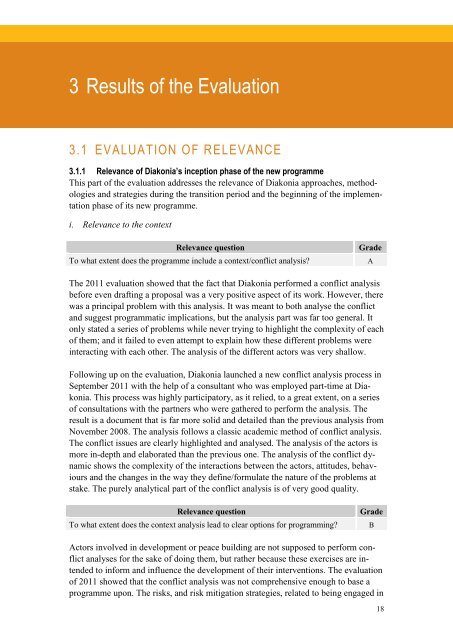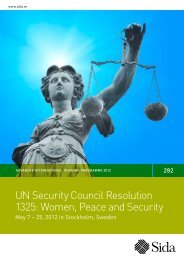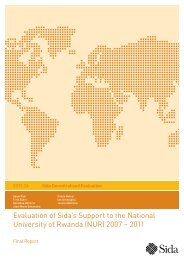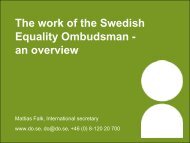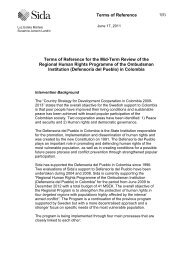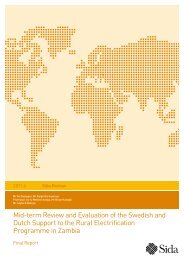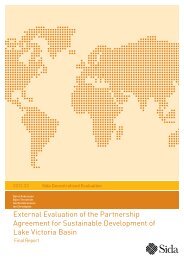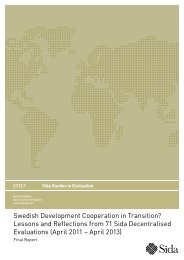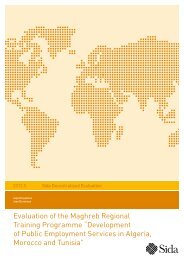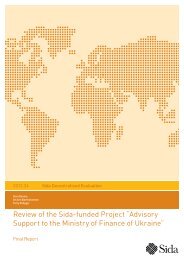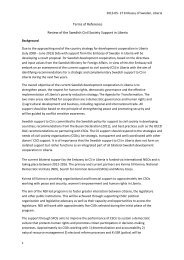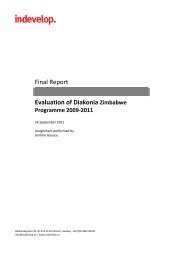Mid-term Review of the Diakonia Strategic Peace Building ... - Sida
Mid-term Review of the Diakonia Strategic Peace Building ... - Sida
Mid-term Review of the Diakonia Strategic Peace Building ... - Sida
You also want an ePaper? Increase the reach of your titles
YUMPU automatically turns print PDFs into web optimized ePapers that Google loves.
3 Results <strong>of</strong> <strong>the</strong> Evaluation<br />
3.1 EVALUATION OF R ELEVANCE<br />
3.1.1 Relevance <strong>of</strong> <strong>Diakonia</strong>’s inception phase <strong>of</strong> <strong>the</strong> new programme<br />
This part <strong>of</strong> <strong>the</strong> evaluation addresses <strong>the</strong> relevance <strong>of</strong> <strong>Diakonia</strong> approaches, methodologies<br />
and strategies during <strong>the</strong> transition period and <strong>the</strong> beginning <strong>of</strong> <strong>the</strong> implementation<br />
phase <strong>of</strong> its new programme.<br />
i. Relevance to <strong>the</strong> context<br />
Relevance question<br />
To what extent does <strong>the</strong> programme include a context/conflict analysis?<br />
Grade<br />
A<br />
The 2011 evaluation showed that <strong>the</strong> fact that <strong>Diakonia</strong> performed a conflict analysis<br />
before even drafting a proposal was a very positive aspect <strong>of</strong> its work. However, <strong>the</strong>re<br />
was a principal problem with this analysis. It was meant to both analyse <strong>the</strong> conflict<br />
and suggest programmatic implications, but <strong>the</strong> analysis part was far too general. It<br />
only stated a series <strong>of</strong> problems while never trying to highlight <strong>the</strong> complexity <strong>of</strong> each<br />
<strong>of</strong> <strong>the</strong>m; and it failed to even attempt to explain how <strong>the</strong>se different problems were<br />
interacting with each o<strong>the</strong>r. The analysis <strong>of</strong> <strong>the</strong> different actors was very shallow.<br />
Following up on <strong>the</strong> evaluation, <strong>Diakonia</strong> launched a new conflict analysis process in<br />
September 2011 with <strong>the</strong> help <strong>of</strong> a consultant who was employed part-time at <strong>Diakonia</strong>.<br />
This process was highly participatory, as it relied, to a great extent, on a series<br />
<strong>of</strong> consultations with <strong>the</strong> partners who were ga<strong>the</strong>red to perform <strong>the</strong> analysis. The<br />
result is a document that is far more solid and detailed than <strong>the</strong> previous analysis from<br />
November 2008. The analysis follows a classic academic method <strong>of</strong> conflict analysis.<br />
The conflict issues are clearly highlighted and analysed. The analysis <strong>of</strong> <strong>the</strong> actors is<br />
more in-depth and elaborated than <strong>the</strong> previous one. The analysis <strong>of</strong> <strong>the</strong> conflict dynamic<br />
shows <strong>the</strong> complexity <strong>of</strong> <strong>the</strong> interactions between <strong>the</strong> actors, attitudes, behaviours<br />
and <strong>the</strong> changes in <strong>the</strong> way <strong>the</strong>y define/formulate <strong>the</strong> nature <strong>of</strong> <strong>the</strong> problems at<br />
stake. The purely analytical part <strong>of</strong> <strong>the</strong> conflict analysis is <strong>of</strong> very good quality.<br />
Relevance question<br />
To what extent does <strong>the</strong> context analysis lead to clear options for programming?<br />
Grade<br />
B<br />
Actors involved in development or peace building are not supposed to perform conflict<br />
analyses for <strong>the</strong> sake <strong>of</strong> doing <strong>the</strong>m, but ra<strong>the</strong>r because <strong>the</strong>se exercises are intended<br />
to inform and influence <strong>the</strong> development <strong>of</strong> <strong>the</strong>ir interventions. The evaluation<br />
<strong>of</strong> 2011 showed that <strong>the</strong> conflict analysis was not comprehensive enough to base a<br />
programme upon. The risks, and risk mitigation strategies, related to being engaged in<br />
18


